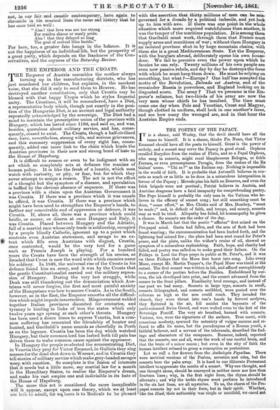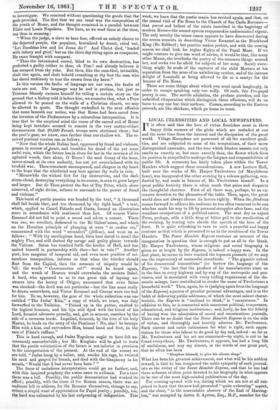THE POETRY OF BIB PAPACY.
IT is a shame, said Wesley, that the devil should have all the tunes to himself. It is a shame, thinks Pio Nono, that Victor Emanuel should have all the poets to himself. Great is the power of melody, and a sonnet may serve the Papacy in good stead. Orpheus recalled Eurydice from the realms of Pluto, and so a Papal Orpheus, who sang in sonnets, might recal blasphemous Bologna, or fickle Ferrara, or even presumptuous Perugia, from the realms of the Re Galant' uomo. " Chi sa as the Italians say. Nothing is impossible in the world of faith. It is probable that Antonelli believes in son- nets as much or as little as he.does in a miraculous interposition in favour of the Papacy ; Merode pins his faith on Zouaves, and even the Irish brigade were not poetical ; Patrizi believes in Austria, and Austrian dragoons have a fatal incapacity for comprehending poetry. The Pope himself is probably the only man in the Vatican who be- lieves in the efficacy of sonnet song; but still something must be done, "some effort," as Mrs. Chicks said of Mrs. Dombey, "must be made ;" and, in default of faith, and troops, and money, sonnets may as well be tried. Allopathy has failed, let homoeopathy be given a chance. So sonnets are the order of the day.
It was in March last that the poetic " afflatus" first seized on the Pro-papal mind. Gaeta had fallen, and the arm of flesh had been found wanting; the excommunication had been hurled forth, and the lightning had missed fire ; the plate had been sent round for Peter's pence, and the plate, unlike the widow's cruise of oil, showed no symptom of a miraculous replenishing. Faith, hope, and charity had failed, and poetry was called on to make good their failure. On the Fridays in Lent the Pope prays in public at St. Peter's, and it was on these Fridays that the Muse first burst into song. Like every Muse, except Mr. Martin Tupper's, the Papal Muse was timid at the outset. The first sonnet was written in ink, and affixed surreptitiously to a corner of the portico before the Basilica. Emboldened by suc- cess, the ink developed into print, and the sonnet advanced from the corner to the front pillars. Familiarity bred courage, and instead of one poet we had many. Sonnets in large type, sonnets in small, sonnets lithographed, and sonnets scribbled, were posted over the columns as high as the arm could reach. They invaded the church, they were thrust into one's hands by fervent acolytes, they flattered in the air, fell amidst the bayonets of the parti-coloured Swiss Guard, and were wafted even to the feet of the Sovereign Pontiff. The very air breathed, burned with sonnets. Various, too, were the signatures of the authors. True merit, with conscious modesty, spurned the notoriety of vulgar success and re- fused to affix its name, but the pseudonyms of a Roman youth, a faithful believer, and a servant of the tabernacle, described the feel- ings and characters of the composers. Rumour, indeed, reported that the sonnets, one and all, were the work of one mortal brain, and that the brain of a minor canon ; but even in the city of faith the human intellect refused to grasp a conception so portentous.
Let us cull a few flowers from the Anlhologia .Papalitus. There were metrical versions of the Psalms, acrostics and odes, but the sonnets bore the palm away. It is hard to our illiterate Protestant intellect to appreciate the merits of a sonnet. Why one thought, and one thought alone, should be conveyed in neither more nor less than fourteen lines ; why, in the first eight lines, the rhyme should be alternate ; and why the treble rhyme must perforce be introduced in the six last lines, are all mysteries. To us, the charm of the Pro- papal sonnets lay not in their form, but in their spirit. Whether, like the Iliad, their authorship was single or manifold, we cared not to investigate. We received without questioning the goods that the gods provided. The first that we can recal was the composition of the youth of Rome, and the thought consisted in a parallel between Pilate and Louis Napoleon. The lines, as we read them at the time, ran thus in meaning:
"When the judge, a slave to base fear, offered an unholy choice to the dejected people, the populace, brutalized by deceit, cried out, 'Let Barabbas live and let Jesus die !' And Christ died, loaded with infamy and grief,' but on the third day rising again as conqueror, He came fraught with conquest.
"Thus the intoxicated crowd, blind to its own destruction, has preferred a guilty robber to thee, oh Pius ! and already believes it has escaped from thy yoke. But thou, like the man-God, invincible, shalt rise again, and shalt behold crouching at thy feet the man who has dared recklessly to tear the crown from thy brow."
In this version the faults of language are our 'own, the faults of taste are not. The language may be and is profane, but just as Tristram Shandy excuses himself for telling a certain story on the ground that a bishop told it before him, we conceive that, what a Pope allowed to be posted on the walls of a Christian church, we may be allowed to quote. The thought embodied in the next effusion that came beneath our notice, was that Rome had been saved from the invasion of the Piedmontese by a miraculous interposition. It is true that to the sceptical mind the cause of the sacred soil of Rome being kept inviolate seemed to consist in the very matter-of-fact circumstance that 20,000 French troops were stationed there; but the poet's gaze, we know, sees further than our shallow wit. The re- ceived poetical version ran as follows : "Now that the whole Italian land, oppressed by fraud and violence, groans in sorrow of .heart, and trembles for dread of the yet more awful ruin, which the future has in store for her in the recesses of its agitated womb, thee alone, 0 Rome ! the mad frenzy of the hour, terror-struck at its own audacity, has not yet overwhelmed with its twofold war. Thou remainest unconquered, and clingest in thy heart to the hope that the whirlwind may beat against thy walls in vain. "Meanwhile the wicked fret for thy destruction, and the dark storm-cloud, destroying everything in its course, is seen to grow larger and larger. But do Thou protect the See of Thy Peter, which alone unmoved, of right divine, refuses to succumb to the power of fraud and violence."
This burst of poetic passion was headed by the text, " A thousand shall fall beside thee, and ten thousand, by thy right hand," a text, which, applied to Castel Fidardo and Gaeta, formed an illustration more in accordance with sentiment than fact. Of course Victor Emanuel did not fail to point a moral and adorn a sonnet. There was one, we recollect, dedicated to the Re Galant'uomo, and which on the Horatian principle of plunging at once " in mediae res,'' commenced with the word " scoundrel" (fellone), and went on as follows : " With thy sacrilegious hand, thou bast dared to assail the mighty Pius, and still dartest thy savage and guilty glance towards the Vatican. Satan has vomited forth the hordes of Hell, and has united himself in partnership with thee—but in vain !" Another poet, less sanguine of temporal aid, and even more positive of mi- raculous interposition, informs us that when the tricolor should float from the Capitol, then the measure of iniquity would be u11: the words " Consummalum eat l" would be heard again, and the wrath of Heaven would overwhelm the modern Babel. A bard, who appeared to us to run great risk of lapsing un- awares into the heresy of Origen, announced that even Satan was shocked—the devil was not particular—but the line must really be drawn somewhere, and Victor Emanuel and Cavour were too bad for him. To us, however, the gem of the whole collection was one entitled " The Judas' Kiss," a copy of which, we trust, was duly forwarded to the Tuileries. " Picked up in the gutter, exalted to the highest honours, and his lips still dyed with the blood of his Lord, Iscariot advances proudly, and, girt in armour, marches by the aide of a ravenous horde. Impelled, forsooth, by the love of his holy Master, he leads on the army of the Pharisees ! No, alas ! he betrays Him with a kiss, and surrenders Him, bound hand and foot, ,to the care of Pilate's ruffians."
This is hard enough, and Judas Napoleon ought to have felt un- commonly uncomfortable ; but Mr. Kinglake will be glad to learn that the poetic vaticination of the future is not inferior in precision to the interpretation of the-present. At the end of the sonnet we are told, " Judas hung by a halter, and, amidst his rage, he twisted his neck and gasped for breath, and died with the blasphemy in his mouth, Would that I had never been born !' " The force of melodious interpretation could go no farther, and, with this inspired prophecy the series came to a climax. For a time there was a lull. Possibly, the public denunciation had worked its effect; possibly, with the close of the Roman season, there was no audience left to address, for the Romans themselves, strange to say, evince a stupid want of appreciation for Papal poetry; possibly, too, the bard was exhausted by his last outpouring of indignation. This
week, we learn that the poetic mania has revived again, and that, on the annual visit of Pio Nono to the Church of San Carlo Boromeo- that purest and holiest of the saints inscribed in the hagiology of modern Rome—the sonnet system reappeared in undiminished vigour. The only novelty the minor canon appears to have discovered during the recess consists in describing Victor Emanuel as the Blockhead King (Re Babbeo); but practice makes perfect, and with the coining season we shall look for higher flights of the Papal Muse. If we might venture to give one word of advice, it would be that, like many other Muses, she overlooks the poetry of the common things around her, and seeks too far afield for subjects of her song. Surely some- thing might be made of the raptures of the child Mortara at his separation from the arms of an unbelieving mother, and of the intense delight of Locatelli at being allowed to die as a martyr for the honour of Pio Nono.
There are some things about which you must speak laughingly, in order to escape speaking only too sadly. Of such, this Pro-papal poetry is one. The servile adulation, the profane parodies, and the unbridled vituperation which distinguish these effusions, will do no harm to any one but their authors. Curses, according to the Eastern proverb, are like chickens, which go home to roost.































 Previous page
Previous page